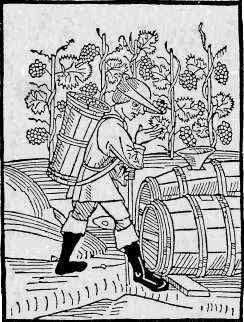Wine-merchants
The favoured wine of the Elizabethans was strong, sweet, white wine: muscadine, malmsey, and sack [sherry]--and they even added sugar to these already sweet wines. (One of Falstaff's nicknames was "Sir John Sack-and-sugar.") Wine was imported from France, Germany, and the Canary Islands, and sold by the barrel--rundlets, hogsheads, butts and pipes.
Because the actions of bacteria were not understood, there was always the danger of the wine spoiling. Wine merchants--vintners--used various techniques to restore wine that had gone "off," some of them amounting to outright adulteration.
Making cheap wine taste expensive
How to flavour muscadine. Take one ounce of corianders, of bay salt, of cloves, of each as much, one handful of savory; let all these be blended and bruised together, and sew them close in a bag, and take half a pint of damask water and lay your flavour into it, and then put it into your butt, and if it [will not] fine, [clarify] give it a parel* and fill it up, and let it lie till it fine, and then stop it close for two or three days at least, and then if you please you may set it abroach.
To make white bastard [a sweet white wine made from the 'bastardo' grape]. . . take a white wine hogshead, and put out the lees [dregs], and wash it clean, and fill it half full and put to it four gallons of new milk and beat it well with the whites of six eggs, and fill it up with white wine and sack [sherry], and it will be white and fine.
From Gervase Markham, The English Housewife (1615).
Footnotes
-
How to perel muscadine
To parel muscadine when it comes new in to be fined in twenty four hours. Take seven whites of new laid eggs, two handfuls of bay salt, and beat them well together, and put therein a pint of sack or more, and beat them till they be as short [frothy] as snow
[Whipped white of eggs]; then draw from the butt seven or eight gallons, and beat the wine, and stir the lees, and then put in the parel and beat it, and so fill it up, and stop it close, and draw it on the morrow.
From Gervase Markham, The English Housewife (1615).
